 MyDogBreeds
MyDogBreeds Puggle is originated from United States but Beagle-Harrier is originated from France. Puggle may grow 12 cm / 4 inches shorter than Beagle-Harrier. Puggle may weigh 12 kg / 26 pounds lesser than Beagle-Harrier. Puggle may live 3 years more than Beagle-Harrier. Puggle may have less litter size than Beagle-Harrier. Both Puggle and Beagle-Harrier requires Moderate maintenance.
Puggle is originated from United States but Beagle-Harrier is originated from France. Puggle may grow 12 cm / 4 inches shorter than Beagle-Harrier. Puggle may weigh 12 kg / 26 pounds lesser than Beagle-Harrier. Puggle may live 3 years more than Beagle-Harrier. Puggle may have less litter size than Beagle-Harrier. Both Puggle and Beagle-Harrier requires Moderate maintenance.
 The first Puggle was bred in the United States in the 1980s and was registered with the American Canine Hybrid Club.
The first Puggle was bred in the United States in the 1980s and was registered with the American Canine Hybrid Club.
None of the major kennel clubs recognize Puggles as a dog breed. The Puggle is a mix between the Pug and the Beagle, and is essentially a companion dog. Both the parent dogs are popular pets and each of the dogs - the Pug and the Beagle have their own histories.
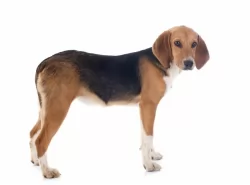 The Beagle Harrier, the breed that was made mixing the France Scent Hounds and a Beagle.
It is not quite sure if this breed was made on purpose or the mix of the breeds happened and resulted in a great dog so the breeding continued.
Since they are not large dogs as hounds, they are used to hunt small animals.
The Beagle Harrier, the breed that was made mixing the France Scent Hounds and a Beagle.
It is not quite sure if this breed was made on purpose or the mix of the breeds happened and resulted in a great dog so the breeding continued.
Since they are not large dogs as hounds, they are used to hunt small animals.
This first breeding took place in England, but after the 14th century, they were breed on purpose in France.
 The Puggle isn’t a purebred and he has short legs, a fairly thickset body, a crooked tail and medium length, floppy ears.
The Puggle isn’t a purebred and he has short legs, a fairly thickset body, a crooked tail and medium length, floppy ears.
The Puggle’s coat is short and smooth and the colors can be anything between fawn, white, tan with bi-coloring such as black and white or even tri-colored such as white, black and tan.
He may have the black mask like the Pug has or he may not. He stands in height between 25-38cm and weighs between 4 and 13kg.
The Puggle brings fun and games into every household with his bright, sociable personality. He gets on well with children and other dogs and makes a splendid pet and friend.
He is intelligent, albeit a bit stubborn too, but you can teach him some simple commands such as sit, stay and lie down. They are dogs which can adapt well to life in the city or in the countryside.
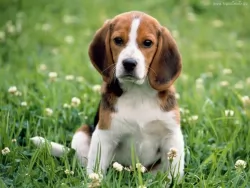 The Beagle Harrier is a scent hound that is described as a big sized Beagle or a small sized Harrier. This breed was developed from this two breeds, actually. Despite the looks of these breeds, the Beagle Harrier is an energetic kind of dog who gets very attached to his family. This medium sized pet comes in variations of colours and they are usually tricoloured. They usually have dark coloured eyes, white paws, and They usually grow up to have a very muscular body, but, if you don’t provide them with the daily activity they need, they will quickly get obese and unhappy.
The Beagle Harrier is a scent hound that is described as a big sized Beagle or a small sized Harrier. This breed was developed from this two breeds, actually. Despite the looks of these breeds, the Beagle Harrier is an energetic kind of dog who gets very attached to his family. This medium sized pet comes in variations of colours and they are usually tricoloured. They usually have dark coloured eyes, white paws, and They usually grow up to have a very muscular body, but, if you don’t provide them with the daily activity they need, they will quickly get obese and unhappy.
 Puggles are lively dogs who are always up for a game. They are affectionate and loving towards their human family and get on well with strangers too.
Puggles are lively dogs who are always up for a game. They are affectionate and loving towards their human family and get on well with strangers too.
They’re the kind of dogs who love a game outside but then are more than happy to cozy up on the couch with you.
Puggles love the attention of their family members and in exchange for your attention he is willing to shower you with his companionship and devotion.
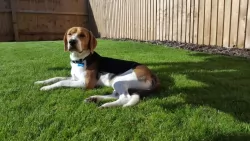 The Beagle Harrier, if trained properly and socialized while he was still a pup, will be the great playmate for any child. They get along with strangers, as well. We might say that they will get along with anybody who is ready to run and play with him. Children are most likely that kind of playdate, so it appears that they like children more. The Beagle Harrier is a great family pet, and he is great with babies, toddlers, teenagers… so don’t be afraid to leave the dog alone during the playdate!
The Beagle Harrier, if trained properly and socialized while he was still a pup, will be the great playmate for any child. They get along with strangers, as well. We might say that they will get along with anybody who is ready to run and play with him. Children are most likely that kind of playdate, so it appears that they like children more. The Beagle Harrier is a great family pet, and he is great with babies, toddlers, teenagers… so don’t be afraid to leave the dog alone during the playdate!
hunting, scent tracking, search dog
Some will say that the Beagle Harrier is one of the most desirable pets because of his loving and lively nature. They get along with almost anyone and they don’t mind living indoors if you have the time to take him out for a daily run each day. They will do great in a large group of people and any public places so you can take your Beagle Harrier with you anywhere you go.
Since the Beagle Harrier is placed in a group of the hound dogs, you must be aware that he will have the attitude of the pack leader. Once you got the Beagle Harrier puppy, you must start training and socializing him in order to grow the pet that will be easy to handle and accepted by the family and all the people around you, even strangers. They are very intelligent and they have a calm nature so they will be quite easy to train.
 Your Puggle isn’t likely to get sick often if you feed him healthy food, you exercise him and provide him with a loving, caring home. However, every dog can become ill, and Puggles can battle with the likes of Cherry Eye, skin problems and Hip Dysplasia among other ailments too.
Your Puggle isn’t likely to get sick often if you feed him healthy food, you exercise him and provide him with a loving, caring home. However, every dog can become ill, and Puggles can battle with the likes of Cherry Eye, skin problems and Hip Dysplasia among other ailments too.
Because of the Pug being a brachycephalic breed, your Puggle might also battle with respiratory problems.
Hip Dysplasia is a common canine disease that has no respect for age or breed of dog. Even young dogs can develop this heritable condition where the thighbone doesn't fit properly into the hip joint. Dog have pain in one or both of the rear legs, and can become totally lame. Arthritis can also develop.
This is when the gland in the dog’s third eyelid bulges out as a red mass. It can be treated surgically.
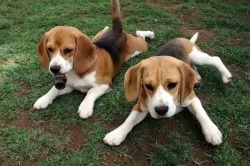 Almost every active dog suffers from joint diseases. Even though it’s generally a genetic disease, you can lower the chances of hip or elbow dysplasia by taking care of your dog’s weight, diet and daily exercise.
Almost every active dog suffers from joint diseases. Even though it’s generally a genetic disease, you can lower the chances of hip or elbow dysplasia by taking care of your dog’s weight, diet and daily exercise.
The Beagle Harrier has big ears that are always set down. That makes them ideal for the dirt accumulation, ear irritations and ear infections. Check his ears regularly and clean them at least once a week.
 The Puggle can settle into life in the city or the countryside as he doesn’t require too much exercise. That doesn’t mean however that you can just ignore his exercise needs, as doing so can make him overweight and unfit.
The Puggle can settle into life in the city or the countryside as he doesn’t require too much exercise. That doesn’t mean however that you can just ignore his exercise needs, as doing so can make him overweight and unfit.
Take him for walks and play games with him indoors as well as outdoors.
The Puggle, with his short-haired coat, is a low maintenance dog that is easy-to-groom. A good brush twice a week will be excellent for him.
A brushing session gives you a chance to look inside his ears for signs of redness and ear infections, to look at his eyes and have a good look inside his mouth. Bad teeth can cause pain but can also cause illness throughout the body.
Trim your dog's claws as well, because left too long they can hook on things and rip the flesh.
Our canine children rely on us for good food to stay healthy. Luckily, for convenience sake, there are excellent commercially manufactured dog foods on the market. The best ones ensure that your dog gets a good balance of vitamins and minerals.
However, you want to also provide your pet with some tasty home-made food too. Dogs thrive on simplicity and consistency, and home-cooked food twice a week and added to the dry kibble can keep him healthy and thrilled with his lot.
Boiled chicken, sweet potatoes, brown rice or pasta, carrots and spinach will be excellent for him – it is simple just as he likes it and it is nutritious. Chop the food up finely and add it into the dry kibble. Also, your Puggle will do well on some raw meat occasionally too as this keeps the skin free of rashes and free of infections.
Make sure he is never without a constant supply of fresh, cool water.
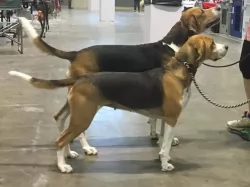 Since the Beagle Harrier is an active dog breed, they will need food for the active dogs. Make sure you provide them with quality food that will give them enough strength to get through the very active day, and not gain too much of the weight. It is very important that you don’t overfeed him because this breed quickly becomes obese. It is advisable to use treats while you train him to do new tricks, but be very careful with the amount you give to the dog.
Since the Beagle Harrier is an active dog breed, they will need food for the active dogs. Make sure you provide them with quality food that will give them enough strength to get through the very active day, and not gain too much of the weight. It is very important that you don’t overfeed him because this breed quickly becomes obese. It is advisable to use treats while you train him to do new tricks, but be very careful with the amount you give to the dog.
Puppies need to be fed only two times a day. Once you decide which brand of food you will use, stick with them until the dog is 6 months old. Make sure they have enough nutrients and the quality ingredients that will help them with growing strong and healthy bones.
If you want Beagle Harrier to grow up in a happy and healthy dog, make sure you provide him with quality food, lots of exercises and unconditional love. They are extremely loving and they get depressed if left alone. Grooming tips are very clear – they need a regular brush because shed a lot. The more you brush, the less hair you will find on your hands during the belly rubs.
If your Beagle Harrier is trained and socialized, the dog park will be the best daily activity for him. If there is no dog park near your house, take him to the bike ride, jogging, swimming, hiking, markets, parks… They love to be off the leash and with people but since they are the hound dogs, don’t be surprised if they get distracted by smelling something more interesting than the ball. They would love to grow up in a house with a large yard, but, if you live in the apartment, make sure that you take time for his daily activity.